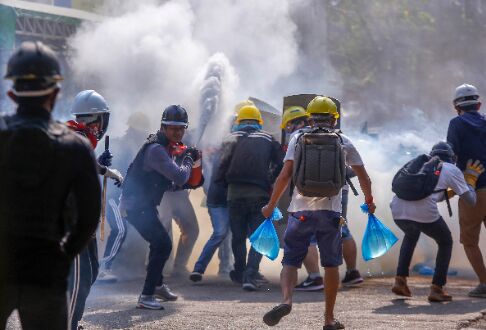Way forward

With Amnesty International's latest report of the Myanmar military using battle tactics against peaceful protestors, the scale and brutality of the Myanmar coup continue to grow. Amnesty, through a series of 50 videos of the crackdown, has verified the killing of at least 60 protestors in a response that the military maintains was 'restrained'. As Amnesty and other groups have noted, the militarised response of Myanmar security forces is not a product of the desperate actions of individual military officers who have been cornered. The use of military equipment and tactics speaks of cold, hard calculation done by 'unrepentant' commanders with plenty of experience dealing with such situations. But the military isn't just using its old tactics from back in the day. The Tatmadaw is also using more modern capabilities to crack down on dissenters. Over the decades, under cover of legitimate policing and anti-terrorism requirements, the junta has gathered a considerable amount of surveillance technology which it is using to spy on its own people and crackdown on dissenters wherever they may hide. The use of surveillance technology such as drones, phone and computer cracking software, etc., has given the military advantage in cracking down on platforms that the protestors use to organise and communicate with each other. Even forums that are still being used by protestors are under constant risk of surveillance and thus are subject to intense paranoia. In doing so, the traditionally reclusive military of Myanmar has shown what it has gained from its regional 'friends' in recent decades. Though it should be mentioned that not all of the surveillance tech being used is Chinese. Much of it is from sources that should not normally be open to the Tatmadaw, like Israel which had previously banned the export of weapons technology to Myanmar over genocide charges relating to the Rohingya crisis. All the same, through the use of intermediaries and such, these technologies were obtained by the junta. All this begs the question as to what will be the end result here? For now, the military is resisting outside pressure. Though the UNSC has sanctioned top junta leaders and in some cases, even their family members, sanctions may not have the desired effect. For one, the UNSC effectively has its hands tied down with Russia and China opposing any UNSC sanctions attempts by even modifying the language of the sanctions to not include any mentions of a coup. But, even if such sanctions were to be used and even escalated, the junta has indicated that it is willing to face any and all international pressure. A statement by Myanmar's deputy military chief declared "We are used to sanctions, and we survived. We have to learn to walk with only a few friends." One way or another, there is a need to disarm the situation. As many commentators have pointed out, by now the Tatmadaw is too used to power and cannot reasonably be expected to step down of its own volition. It must be persuaded to back down and sanctions are not likely to be the answer. The obvious answer would be to use the 'few friends' that the junta does have to place effective pressure to return things to the status quo. As the situation stands, the military cannot sustain its current course of action as it struggles with a hamstrung economy and difficult to operate administrative setup. Short of full-scale military interventionism, creating the conditions for a compromise is the only real option for the international community. But even when this crisis ends, the troubles for Myanmar do not. There are plenty of underlying issues, which existed during Aung Suu Kyi's rule as well, which will continue and create a source of new tensions. The role of the military in running the government will also likely continue being a source of friction in the future even if this particular crisis was to be negotiated.



